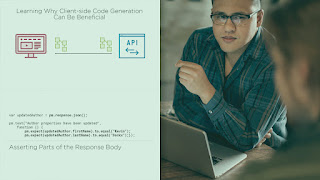Hello guys, if you want to learn Swagger and looking for the best online
courses then you have come to the right place. In the past, I have shared the
best REST API courses
as well
best Postman courses, one of the best tools to test REST API and in this article, I am going to
share the best online courses to learn Swagger in 2025. I have curated this
list from my favorite online learning platform like Udemy, Pluralsight,
and Coursera and they are suitable for both beginners and intermediate
developers who want to master the Swagger tool. But before we jump into these
courses Let us start with the simple stuff first. What exactly is Swagger and
Open API?
Swagger can be defined as a set of rules, tools, and specifications that can
be used for describing and developing RESTful APIs. It is also open-source,
allowing developers to create interactive and human-readable API
documentation.
In the most basic terms, what Swagger does is that it generate API
specifications by asking the API to return a documentation file from its
annotations. This is extremely helpful for developers looking to build,
document, test, and
consume RESTful web services.
Another main advantage of using Swagger is that it can design an API before
any code is written. This is known as the bottom-up method, where Swagger
takes the code written for an API and generates the documentation.
Swagger provides a wide range of open-source tools to developers, like Swagger
Editor, Swagger Codegen, Swagger User Interface, and Swagger Inspector. The
main aim of Swagger is to standardize and simplify API practices.
Swagger was created in 2011 by Tony Tam. It was first designed as a framework
for easing API automation. It was then made open-source when it became a hit
with developers and companies and is now known as Open API and used
extensively for documenting APIs. In fact, it's one of the most popular tools
for API documentation.
5 Best Udemy Courses to Learn Swagger and Open API in 2025
Now, if you are wondering where to learn Swagger then don't worry. We have
done the hard work and compiled a list of the Top 5 Courses to Learn Swagger.
The only thing you have to do is select a course from the list and start
learning. So what are you waiting for?
This is one of the shortest courses on this list that you can complete within
an hour. Sounds cool, right? You will also learn all you need to know about
API Definition Files, Tools, and Documentation.
This course will teach you how to read and write Open API Specification or
Swagger files that can be used to define and document APIs. You will also
learn how to use the different Swagger tools to edit files, create
documentation, and create SDKs.
Course Duration: 1 hour
Course Rating: 4.4 stars out of 5
Course Instructor: Peter Gruenbaum
Course Price: $16
Overall a great course to learn Swagger from scratch in 2025. I highly
recommend this course to beginners and intermediate developers.
This is also a short and intermediate-level course that you can find on the
Pluralsight platform. In this course, you will learn how to test your API to
improve its reliability.
Through this course, you will gain the ability to test an API and generate
code from it. You will start off by learning what Swagger is and discovering
how it can be used for code generation. As a bonus, you will also gain
knowledge about .NET Core that can be used to generate client-side code.
Course Duration: 2 hours
Course Rating: 4.5 stars out of 5
Course Instructor: Kevin DockX
Course Price: $140 per year for the Premium plan
By the way, you would need a Pluralsight membership to join this course
which costs around $29 per month or $299 per year (14% discount). I highly
recommend this subscription to all programmers as it provides instant access
to more than 7000+ online courses to learn any tech skill. Alternatively,
you can also use their
10-day-free-pass
to watch this course for FREE.
This one is slightly different from the other courses on this list and focuses
primarily on the Swagger Editor, which is one of the most useful tools in
Swagger. In this course, you will get a broad overview of Open API
Specification through Swagger that you can use to create definitions of
RESTful APIs.
This course will also take you through an example case study that will make
you understand the Swagger Editor. You will get a basic understanding of
concepts like REST APIs and JSON.
Course Duration: 2 hours
Course Rating: 4.5 stars out of 5
Course Instructor: Emma Martin
Course Price: $20
By the way, this is a guided project from Coursera. The best thing about
the Guided project is that you don't need to download or set up anything.
Your
workspace is a cloud desktop right in your browser and your instructor will
explain to you what to do in a split-screen video. It's probably the next best
after classroom and personal training.
And, if you find Coursera courses useful, then I suggest you join the
Coursera Plus, a subscription plan from Coursera which gives you unlimited access to their
most popular courses, specialization, professional certificate, and guided
projects. It cost around $399/year but it's the best investment you can make to
upskill yourself.
They are also offering $200 discount now which means you can get one year of Coursera for just $199 and can save 50% money. Though, this offer is only for limited time and only available on
this special page. Get it before its gone.
This course will act as your one-stop guide for learning about Open API
(Swagger) Specification that can be used for creating highly productive API
design, documentation, and development.
When you purchase this course, you
will get lifetime access to more than 2 hours of on-demand video lectures,
12 articles, and 3 downloadable educational resources.
You will gain a deep understanding of the structure of Open API
Specification and become an expert in Swagger. You will also get access to
downloadable PDFs like Open API Quick Guide and HTTP Status Codes Cheat
Sheet.
Course Duration: 3 hours
Course Rating: 4.8 stars out of 5
Course Instructor: Praveenkumar Bouna
Course Price: $16
Overall a nice hands-on course to master Open API and Swagger from
scratch. You can also join this course on Udemy.
This is one of the best courses to learn Open API, formerly known as Swagger,
and one of the best tools for API documentation. This course will teach you
how to take on the tedious but essential task of documenting your API. You
will learn how to use Swagger or Open API UI to generate API documentation.
You will start off by learning how to create a UI that allows you to test the
API. You will also learn how to use attributes and conventions to improve the
generated Open API Specification.
As a bonus, the course will also teach you
how to deal with authentication, versioning, and UI customization.
Course Duration: 5 hours
Course Rating: 4.4 stars out of 5
Course Instructor: John Thompson
Course Price: $10 on Udemy Sale
I am a big fan of John Thompson teaching style and having attended
his several courses on Spring Framework, Spring Boot, Spring Cloud, Maven, and
Java it was no brainer for me to join this course and I must say I wasn't
disappointed.
It actually exceeded my expectation and I highly recommend every
beginner and intermediate developer who wants to learn API documentation and
Open APOI to join this course.
Frequently Asked Questions
Now that we have seen the best online courses to learn Swagger or Open API,
its time to answer frequently asked questions about Swagger and API
documentation.
1. What is Swagger and why is it used?
Swagger can be defined as a set of rules, tools, and specifications that can
be used for describing and developing RESTful APIs. It is also open-source,
allowing developers to create interactive and human-readable API
documentation.
2. Is Swagger a framework?
Swagger was created in 2011 by Tony Tam. It was first designed as a
framework for easing API automation. It was then made open-source when it
became a hit with developers and companies.
3. Is Swagger a tool?
Swagger has been used to create some of the most well-known tools for
implementing the Open API Specification.
4. What is the difference between Swagger and OpenAPI?
Both are the same, Swagger is the old name of OpenAPI. When Swagger went
open source, it adopted the name Open API.
That's all about the
best Udemy courses to learn Swagger or OpenAPI in 2025. These are by
far the best courses that you can use to learn more about Open API
Specification or Swagger. You will be able to transform yourself from a
complete beginner to a Swagger expert within a matter of weeks. Don't worry,
you can thank me later.
Other
Web Development Articles You May Like:
Thanks for reading this article so far. If you liked this list of the Top
5 Courses to Learn Swagger, feel free to share it with your friends and
family. Drop a comment if you have any doubts or questions and we will get
back to you as soon as possible.
P. S. - If you are keen to learn Web development and looking for a
full, comprehensive online course to learn Web development then I highly
recommend you to join
The Complete 2025 Web Development Bootcamp
course by Angela Yu, one of my favorite and best Udemy instructors. More
than 320K students have already joined this course.















1 comment :
Is Swagger even worth learning? I heard REST Assured is better for testing REST APIs and you can always create confluence page to document your API or you can create a readme page or a client connection guide, what advantage does Swagger offers over these conventional methods of documenting APIs? What am I missing if I am not using Swagger in my project?
Post a Comment